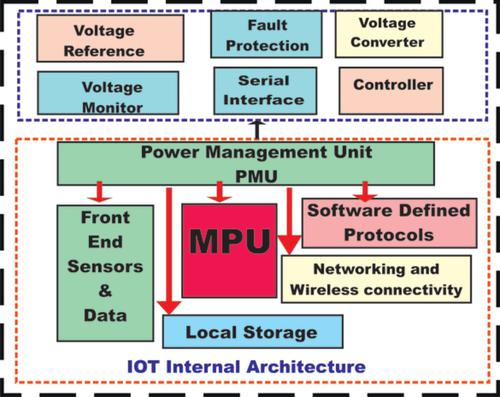当前位置:
X-MOL 学术
›
Int. Trans. Electr. Energy Syst.
›
论文详情
Our official English website, www.x-mol.net, welcomes your
feedback! (Note: you will need to create a separate account there.)
Self‐adaptive learning based controller to mitigate PQ issues in internet of things devices
International Transactions on Electrical Energy Systems ( IF 1.9 ) Pub Date : 2021-03-29 , DOI: 10.1002/2050-7038.12888 Garima Goswami 1 , Pankaj Kumar Goswami 2
International Transactions on Electrical Energy Systems ( IF 1.9 ) Pub Date : 2021-03-29 , DOI: 10.1002/2050-7038.12888 Garima Goswami 1 , Pankaj Kumar Goswami 2
Affiliation

|
The Internet of Things (IoT) systems elicit high speed, precise control and remote access to devices in public and industrial applications. The ease of remote access revokes the issue of system ambiguities due to the presence of hybrid load characteristics. The high‐performance power electronics‐based converters and non‐linear loads pulled out several undesirable power quality issues. Among various performance pursuits, harmonic distortion analysis is at high priority in smart electronic devices. This work analyses the attributes of hybrid load system in smart IoT based devices to observe power quality issues and successful implementation of a smart self‐adaptive learning technique to minimize the harmonic distortions. The model explains the risk analysis and identifies the architectural complexities of the Power Management Unit (PMU) in IoT devices. Hysteresis current control is applied for the generation of reference current to actuate the Shunt Active Power Filter (SAPF) for mitigation of harmonics distortions in distribution supply. Based on real time non‐linear load analysis parameters, ANFIS is trained to compensate the harmonic distortion. The experimental setup validates the error deviation data set for the neural network training and the adaptive control strategy. The analysed empirical weight of the neuron is adopted through various learning layers and minimizes the total harmonic distortion (THD) to a remarkable value from 72.8% to 0.81% at non‐linear load. This validates the high feasibility of the control strategy in various real time smart IoT applications in accordance of IEEE 519 standards.
中文翻译:

基于自适应学习的控制器可减轻物联网设备中的PQ问题
物联网(IoT)系统引发了对公共和工业应用中设备的高速,精确控制和远程访问。由于存在混合负载特性,远程访问的简便性消除了系统歧义的问题。基于高性能电力电子的转换器和非线性负载消除了一些不良的电能质量问题。在各种性能追求中,谐波失真分析是智能电子设备中的重中之重。这项工作分析了基于智能IoT的设备中混合负载系统的属性,以观察电能质量问题并成功实施了智能自适应学习技术,以最大程度地减少谐波失真。该模型解释了风险分析并确定了IoT设备中电源管理单元(PMU)的架构复杂性。迟滞电流控制用于产生参考电流,以启动并联有源功率滤波器(SAPF),以减轻配电电源中的谐波失真。基于实时非线性负载分析参数,对ANFIS进行了训练以补偿谐波失真。实验设置验证了神经网络训练和自适应控制策略的误差偏差数据集。经过分析的神经元经验权重通过各种学习层采用,并且在非线性负载下将总谐波失真(THD)最小化到从72.8%到0.81%的显着值。
更新日期:2021-05-03
中文翻译:

基于自适应学习的控制器可减轻物联网设备中的PQ问题
物联网(IoT)系统引发了对公共和工业应用中设备的高速,精确控制和远程访问。由于存在混合负载特性,远程访问的简便性消除了系统歧义的问题。基于高性能电力电子的转换器和非线性负载消除了一些不良的电能质量问题。在各种性能追求中,谐波失真分析是智能电子设备中的重中之重。这项工作分析了基于智能IoT的设备中混合负载系统的属性,以观察电能质量问题并成功实施了智能自适应学习技术,以最大程度地减少谐波失真。该模型解释了风险分析并确定了IoT设备中电源管理单元(PMU)的架构复杂性。迟滞电流控制用于产生参考电流,以启动并联有源功率滤波器(SAPF),以减轻配电电源中的谐波失真。基于实时非线性负载分析参数,对ANFIS进行了训练以补偿谐波失真。实验设置验证了神经网络训练和自适应控制策略的误差偏差数据集。经过分析的神经元经验权重通过各种学习层采用,并且在非线性负载下将总谐波失真(THD)最小化到从72.8%到0.81%的显着值。











































 京公网安备 11010802027423号
京公网安备 11010802027423号